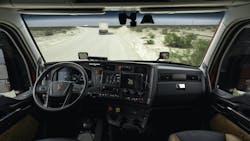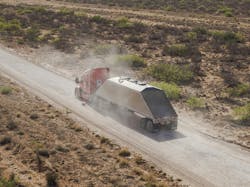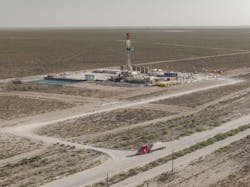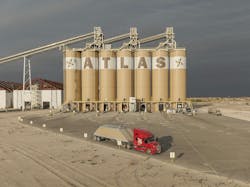A “new driverless era for the autonomous trucking industry” has begun.
That is how Don Burnette, Kodiak Robotics founder and chief executive, described the initial 21-mile runs of frac sand by Kodiak-equipped Class 8 trucks with no human driver. The first driverless hauls were completed on private leased roads for Atlas Energy Solutions in Texas and New Mexico.
“We used our on-highway trucks to do the first driverless delivery in the Permian Basin’s private lease road network to demonstrate the capabilities of the Kodiak Driver, our industry-leading autonomous system,” Burnette told FleetOwner. “We operated the first driverless run with no one inside the cab.”
The Atlas operations move Kodiak closer to its mid-decade intentions to offer its technology for humanless middle-mile operations along divided public highways for robotic trucks. Over the past year, Kodiak has unveiled more ways AV can operate with truckports and how fleets can handle pre-trip and roadside inspections with a professional truck driver behind the wheel.
See also: The future is almost here for latest truck technology
After successful testing this year, Atlas ordered two Kodiak-equipped trucks to deliver frac sand across the Permian Basin’s existing private roads. The Permian Basin is the highest-producing oilfield in the U.S. The two trucks would join the private fleet’s other 120 human-operated trucks. Atlas plans to begin nearly 24/7 operations with the Kodiak equipment in early 2025, the two companies announced in July.
“Once Atlas takes delivery of the Kodiak-equipped trucks, they will operate them with our support,” Burnette explained. “We will provide our technology to Atlas via a driver-as-a-service licensing agreement as well as operational support services, including remote monitoring from our operations center in Lancaster, Texas.”
Both companies noted that the hot and dry climate in the Permian Basin can make truck driving challenging. According to the company, the Kodiak Driver, which has been in pilot testing across Texas and much of the Sunbelt, can handle driving through harsh conditions, including dust storms that impact visibility and extreme heat.
“The Permian Basin’s expansive private lease road network, which expands across the Delaware and Midland Basins, is an ideal environment in which to introduce autonomous trucking in North America,” Chris Scholla, Atlas’ chief supply chain officer, said. “With average traffic speeds of under 20 mph on these large swaths of private roads, we can safely deliver a more reliable last-mile solution to our customers in the Permian Basin. This truly represents a step-change in oilfield logistics.”
Atlas operates 12 proppant production facilities across the Permian Basin with a 28-million-ton annual production capacity. Proppant material, such as sand, is used with fracturing fluid during hydraulic fracking to keep ground fractures open for energy extraction.
Trucking’s driverless transportation transition
Coming just months after Kodiak announced in January that its technology is ready to remove humans from in-cab operations, the new Atlas partnership represents the first reported time that Class 8 equipment has been moved to haul freight without a human driver.
Other autonomous freight companies, such as Einride and Gatik, have successfully moved goods and materials with medium-duty equipment. Einride’s driverless vehicles also operate on private roads. Gatik’s autonomous box trucks are in driverless operations for Walmart and other retailers in Texas, Arkansas, and Ontario, Canada.
Other Kodiak rivals, such as Daimler-owned Torc Robotics and Aurora, have plans to go to market with OEM partners: Torc plans to debut its AV technology in Daimler Truck North America’s Freightliner Cascadia in 2027, while Aurora has agreements with Volvo Trucks and Paccar’s Kenworth and Peterbilt brands to equip new truck models in the coming years. Kodiak’s technology, however, is equipment agnostic and can be upfitted to most modern Class 8 vehicles.
See also: Truck drivers and autonomous trucks: A powerful partnership for America's future
Aurora announced July 30 that an outside auditor concluded the public tech company is proactive, responsible, and thorough in its safety approach. Aurora leaders noted the TÜV SÜD audit was important as the autonomous company prepares to deploy driverless trucks at scale, helping the organization understand the robustness of its safety policies and programs.
For more than five years, Kodiak has been fine-tuning its Kodiak Driver technology, which is now in its sixth generation. When it announced its intentions to remove the driver from the cab earlier this year, the company had already completed more than 2.5 million miles of human-monitored testing on U.S. highways with major fleets such as C.R. England, Tyson Foods, Martin-Bower, and others.
“This partnership with Atlas shepherds a new driverless era for the autonomous trucking industry and shows that our autonomous technology is fully capable of commercial driverless operations,” Burnette told FleetOwner. “Delivering the first driverless truck to a customer is a significant milestone for us, for Atlas, and for the entire industry. This is just the beginning of what we see as a bright, driverless future.”
He said that Kodiak is monitoring a “wide range of metrics to ensure our technology is being implemented safely.” That includes constant observations from Kodiak’s Texas operations center.
“We are excited about this tremendous opportunity to gain real-world driverless experience with a customer,” the CEO said. “Our work with Atlas ultimately benefits all of our customers, including our over-the-road trucking customers and the U.S. Department of Defense, as we gain invaluable experience managing driverless operations.”
Burnettes said the Atlas AV operations will also help Kodiak refine its on-road safety metrics, demonstrating that its technology is ready for public roads. “This will be imperative as we work towards expanding our technology to other fleets,” he noted.
There are already AV-friendly regulations in Texas, New Mexico, and other Southern states. “Twenty-five states have passed legislation enabling autonomous operations,” Burnette added. “And we have found solutions for virtually all of the regulatory barriers to driverless deployment.”
About the Author
Josh Fisher
Editor-in-Chief
Editor-in-Chief Josh Fisher has been with FleetOwner since 2017. He covers everything from modern fleet management to operational efficiency, artificial intelligence, autonomous trucking, alternative fuels and powertrains, regulations, and emerging transportation technology. Based in Maryland, he writes the Lane Shift Ahead column about the changing North American transportation landscape.




